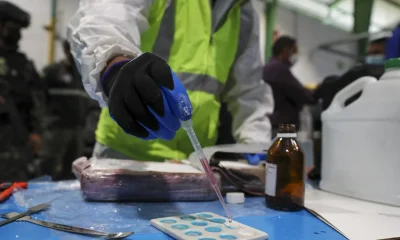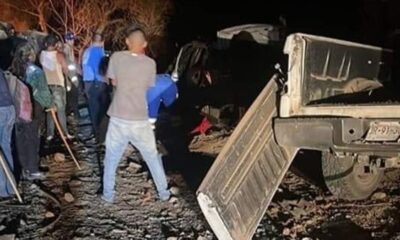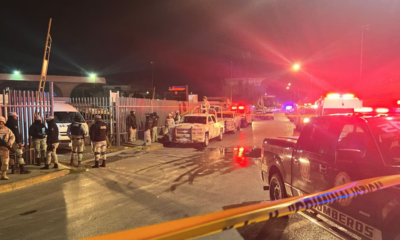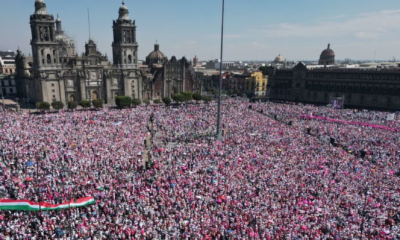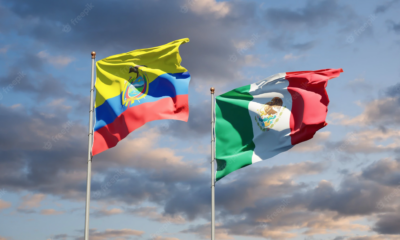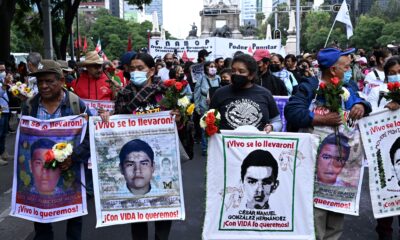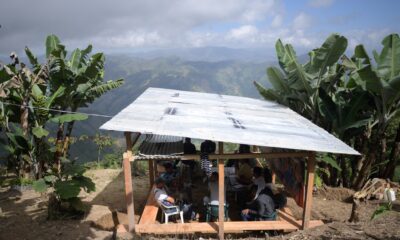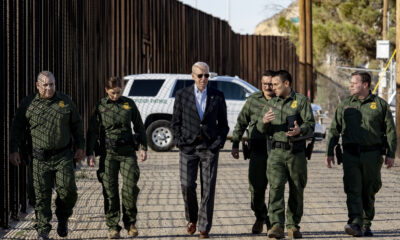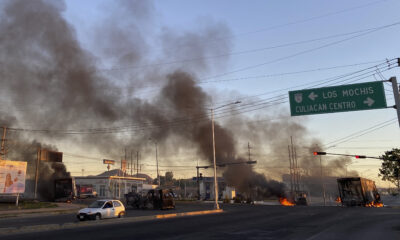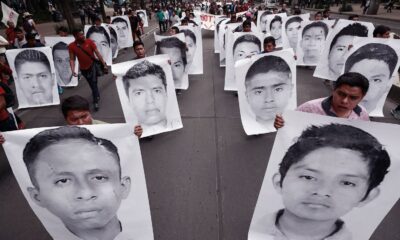International
29 killed in arrest of Mexico drug kingpin’s son
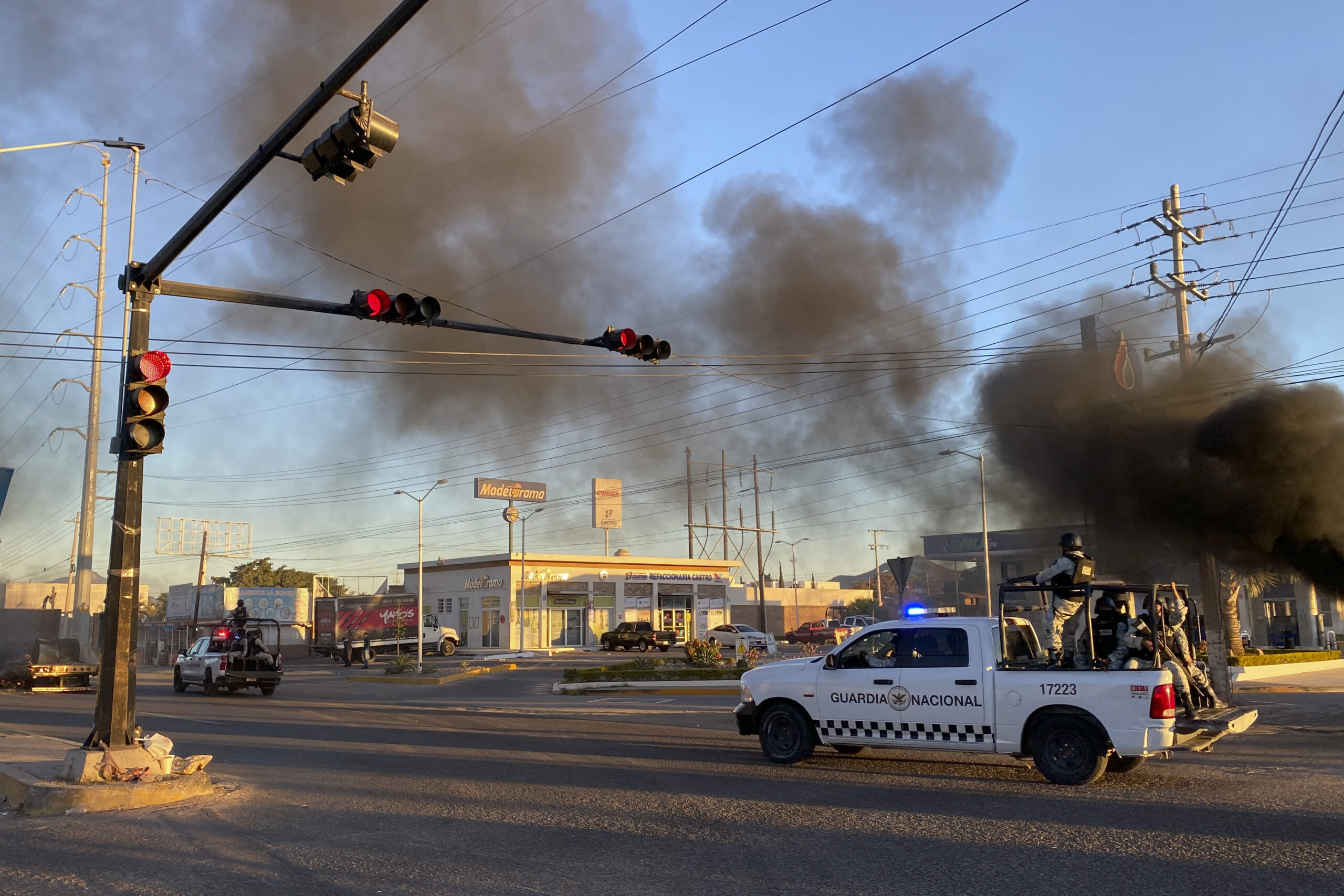
January 6th | By AFP |
Ten soldiers and 19 suspected criminals were killed in an operation to arrest a son of jailed drug trafficker Joaquin “El Chapo” Guzman, Mexico’s government said Friday, with a dramatic shootout sowing terror at an airport.
Thousands of soldiers retook control of the Sinaloa cartel stronghold of Culiacan, which resembled a war zone after furious gunmen went on the rampage to try to free their boss.
Ovidio Guzman was captured in the northwestern city on Thursday and flown to Mexico City before being transferred to the high-security Altiplano prison in central Mexico from which “El Chapo” escaped in 2015.
The 32-year-old, nicknamed “El Raton” (The Mouse), had allegedly helped to run his father’s operations since the former Sinaloa cartel boss was extradited to the United States in 2017.
A colonel who commanded an infantry battalion was among those killed after his team came under attack following the arrest, Defense Minister Luis Cresencio Sandoval told reporters.
Another 35 soldiers sustained gunshot wounds and were taken to hospital, while 21 gunmen were arrested.
Sandoval said a civilian airliner that was about to take off from Culiacan International Airport, as well as two Mexican Air Force aircraft, were hit as cartel henchmen tried to free Ovidio Guzman.
The military planes “had to make an emergency landing” after receiving “a significant number of impacts,” said Sandoval.
No injuries resulted from the plane attacks and Culiacan airport resumed operations on Friday.
Multimillion-dollar bounty
The United States had issued a reward of up to $5 million for information leading to Ovidio Guzman’s capture. It accuses him of being a key player in the Sinaloa cartel founded by his father.
The arrest came as Mexican President Andres Manuel Lopez Obrador prepared to welcome his US counterpart Joe Biden for a North America leaders’ summit next week where security is expected to be high on the agenda.
Mexico denied that the United States had been involved in the operation to catch Ovidio Guzman.
“We act autonomously, independently. Yes there is cooperation and there will continue to be, but we make the decisions as a sovereign government,” Lopez Obrador told reporters.
He said calm had returned to Culiacan, where security forces removed dozens of stolen and burnt out vehicles scattered throughout the city of 800,000 people.
Videos on social media Thursday showed passengers and Aeromexico airline employees ducking behind counters as gunfire rang out at Culiacan airport.
Cartel gunmen set cars and trucks ablaze at several intersections in the city, and authorities reported 19 roadblocks.
Cocaine, meth and fentanyl
El Chapo is serving a life sentence in the United States for trafficking hundreds of tons of drugs into the country over the course of 25 years.
However, his cartel remains one of the most powerful in Mexico, accused by Washington of exploiting an opioid epidemic by flooding communities in the United States with fentanyl, a synthetic drug about 50 times more potent than heroin.
Ovidio Guzman and one of his brothers are accused of overseeing nearly a dozen methamphetamine labs in Sinaloa as well as conspiring to distribute cocaine and marijuana, according to the US State Department.
Ovidio Guzman also allegedly ordered the murders of informants, a drug trafficker and a Mexican singer who refused to perform at his wedding, it said.
He was captured briefly once before in 2019, but security forces freed him after his cartel waged an all-out war in response.
His release prompted sharp criticism of Lopez Obrador, who said the decision was made to protect civilians’ lives.
Foreign Minister Marcelo Ebrard has played down the prospects of a fast-track extradition, saying Ovidio Guzman was expected to face legal proceedings in Mexico.
Mexico has registered more than 340,000 murders since the government controversially deployed the army to fight drug cartels in 2006, most of them blamed on criminal gangs.
International
Trump Floats “Friendly Takeover” of Cuba Amid Rising Tensions

U.S. President Donald Trump said Friday that his administration is considering what he described as a “friendly takeover” of Cuba, as Washington continues to increase pressure on the island’s communist government.
“The Cuban government is talking to us and they have very serious problems, as you know. They have no money, they have nothing at this moment, but they are talking to us and maybe we will see a friendly takeover of Cuba,” Trump told reporters as he departed the White House for a trip to Texas.
Earlier in the week, U.S. Secretary of State Marco Rubio said Cuba needed a “radical change,” shortly after Washington eased restrictions on oil exports to the island for what officials described as “humanitarian reasons,” amid a deep economic crisis.
The United States has imposed an energy blockade on Cuba since January, citing what it calls an “extraordinary threat” posed by the communist-run island, located roughly 150 kilometers (90 miles) off the coast of Florida, to U.S. national security.
International
Argentina’s Senate Reviews Milei-Backed Labor Overhaul

Argentina’s Senate on Friday began reviewing the Labor Modernization Law promoted by the administration of President Javier Milei, a proposal that would significantly reshape labor rules across the country.
The upper chamber opened its final discussion of the contentious initiative, which revises the method used to calculate severance payments — lowering the amounts owed in dismissal cases — and introduces an “hour bank” mechanism that allows overtime to be offset with paid leave rather than extra wages.
The legislation also broadens the classification of essential services, a change that would place new limits on the right to strike in designated sectors.
The bill was initially approved by the Senate on February 11 and then moved to the Chamber of Deputies, where lawmakers passed it with amendments. It has now returned to the Senate for definitive approval.
Outside the Congress building in Buenos Aires, workers, trade unions and left-wing organizations staged demonstrations beginning at midday. The gathering later thinned out amid reports of disturbances and a strong police presence. Security forces had secured the area surrounding the legislature since early morning hours.
Union leaders contend that the reform weakens labor protections, while many business representatives back the measure but stress that sustainable formal employment will require economic expansion, improved credit conditions, greater investment and a more dynamic domestic market.
International
Federal Judge Blocks Trump Policy Allowing Deportations to Third Countries

A federal judge ruled on Wednesday that the policy of U.S. President Donald Trump’s administration allowing immigration authorities to deport foreign nationals to third countries without prior notice or the opportunity to object is unlawful. The decision marks another legal setback for the administration on immigration matters.
Judge Brian Murphy of the U.S. District Court for the District of Massachusetts struck down the regulation issued last year, which stated that Immigration and Customs Enforcement (ICE) was not required to notify migrants if they were to be sent to countries other than the one listed in their removal order, provided that receiving nations offered assurances they would not face persecution or torture.
Murphy ordered the measure vacated but granted a 15-day delay before the ruling takes effect, giving the Trump administration time to file an appeal.
In his decision, the judge concluded that the policy violates federal immigration law and migrants’ due process rights. He also questioned the lack of transparency surrounding the alleged assurances provided by receiving countries, stating that “no one really knows anything about these supposed ‘assurances.’” He added, “It is not right, and it is not lawful.”
The ruling follows several legal disputes involving deportations to third countries. Last year, the executive branch deported more than 200 Salvadorans to a maximum-security prison in El Salvador, invoking an old wartime law. The White House also held talks with Costa Rica, Panama, and Rwanda about receiving migrants who are not citizens of those countries.
In May, the same judge determined that the government violated a court order when it attempted to remove a group of immigrants with criminal records to South Sudan without prior notice or an opportunity to raise claims of fear of persecution.
Although President Donald Trump took the case to the U.S. Supreme Court, which temporarily allowed the deportations to resume while a final decision was pending, the White House is expected to again appeal to higher courts to overturn this latest judicial ruling.
-

 International2 days ago
International2 days agoFamily of “El Mencho” Seeks Return of Body After Deadly Military Operation
-

 International2 days ago
International2 days agoLarry Summers Steps Down from Harvard Role Amid Epstein Controversy
-

 International2 days ago
International2 days agoIran’s President Optimistic Ahead of Geneva Nuclear Talks with U.S.
-

 International2 days ago
International2 days agoBill Gates Admits “Serious Mistake” Over Epstein Ties
-

 International2 days ago
International2 days agoStephen Hawking Photo Appears in Newly Released Epstein Documents
-

 International4 days ago
International4 days agoOver 40 Million Affected by Major Snowstorm in Northeastern U.S.
-

 International1 day ago
International1 day agoCocaine Production Surges 34% in 2023 as Market Expands into Africa and Asia
-

 International4 days ago
International4 days agoNine People Killed in Two Armed Attacks in Manabí, Ecuador
-

 International1 day ago
International1 day agoFederal Judge Blocks Trump Policy Allowing Deportations to Third Countries
-

 International1 day ago
International1 day agoClinton Accuses Republican Committee of Using Epstein Case to Shield Trump
-

 International6 hours ago
International6 hours agoArgentina’s Senate Reviews Milei-Backed Labor Overhaul
-

 International6 hours ago
International6 hours agoTrump Floats “Friendly Takeover” of Cuba Amid Rising Tensions



























